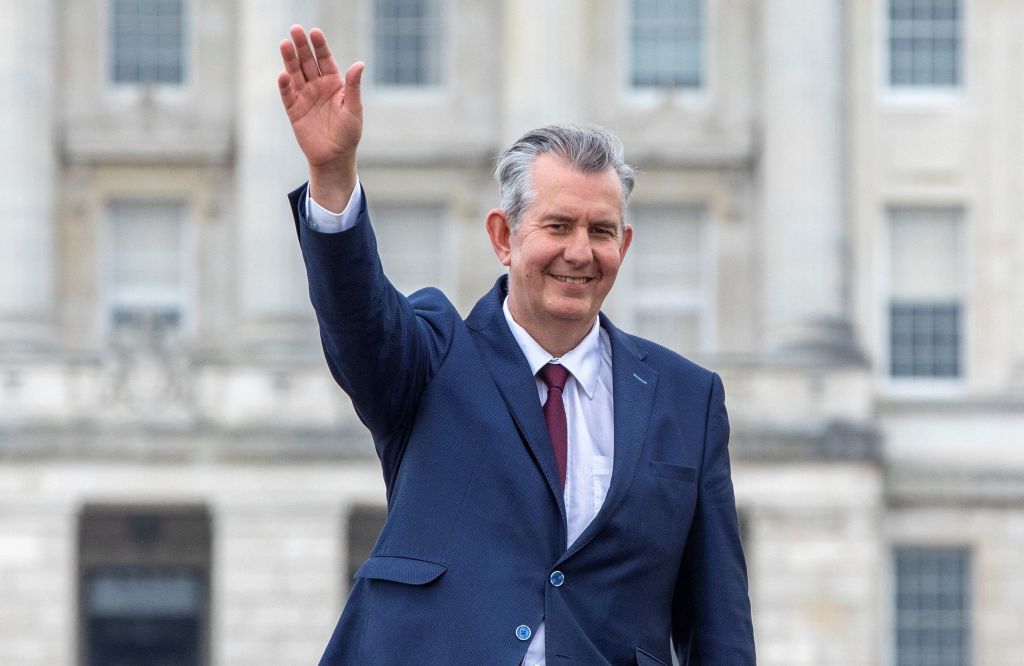Are we witnessing the end of the DUP as the dominant unionist party in Northern Ireland? Tumultuous events in Belfast in recent days suggest as much.
The DUP gathered on Thursday night to ratify the appointment of Edwin Poots and Paula Bradley as the party’s new leader and deputy leader. A dull rubber-stamping it was not; the meeting turned into the most public display of discord and factionalism in the party’s 50-year history.
Rather than listen to Poots make his acceptance speech, Jeffrey Donaldson, the MP Gavin Robinson and both Nigel and Diane Dodds stood up and left. Dissatisfaction with how Arlene Foster was treated was given as the reason for the walk-out, with some party activists also resigning from their positions.
Can this divided party survive, let alone be the convincing electoral force it once was?
For long-term DUP watchers, this airing of dirty laundry was extraordinary given how the party had previously operated. A cult of personality was built around the late Ian Paisley. More recently, while pockets of dissent and ill-discipline broke out occasionally under the leadership of Peter Robinson and Arlene Foster, the line held.
Yet much like the Belfast Agreement broke the Ulster Unionists, allowing the DUP to sweep in, Brexit and the Protocol has broken the DUP and the fragile coalitions which existed within it. Those from the moderate wing who stayed to listen to Edwin Poots speak would have been treated to the greatest hits of dreary, old time unionism. For those drawn into the DUP over the years by the likes of Robinson, this denial of the political and social realities in Northern Ireland surely spells the end of it having any pretence of being a broad church.
While politics is the main thing in this schism, personalities are at play here. Ian Paisley Jr, Poots’ frontman, spoke of how his own father – ousted as leader by the party’s reformers – died of a broken heart as a result. With Poots in power, himself the son of a founding member of the party, there is very much a sense that those who regard control of the DUP as their rightful inheritance are reasserting themselves.
Can this divided party survive, let alone be the convincing electoral force it once was? The scale of the schism suggests otherwise, which may in fact be no bad thing. A less hegemonic DUP could be the boon unionism needs.
Unionism over the years has suffered as an ideology by being too closely associated with the dominant party of the day. It is more nuanced than it is given credit for, and a revitalised UUP becoming a home for the more liberally inclined may encourage the intellectual and strategic curiosity which unionism has been lacking for some time.
Rather than have one catch-all party, why not have a political landscape which reflects the different social, economic and cultural standpoints of unionists from across all of Northern Ireland? There is already talk of DUP defections to the Ulster Unionists. The party’s leader Doug Beattie has said he will be willing to accept any political refugees, provided they sign up to ‘UUP values’; defining those sooner rather than later will be essential to the UUP capitalising on the opportunity presented to them.
Accepting multi-party unionism will require a fundamental shift in the way unionism approaches politics, away from the zero-sum game which prioritises numerical superiority and defeat of ‘our enemies’, as Poots so described them in his speech. A recent LucidTalk poll – which suggested Sinn Fein will be the largest party – has evidently spooked them, going by Poots’ rally-round-the-flag call to action. Whether anyone is listening beyond the diminishing DUP base is a moot point.
How long Poots lasts as leader of the DUP remains to be seen; one source has described this as the party’s Corbyn moment. However, this moment of self-indulgence and navel gazing may reinvigorate some dormant elements of unionism which will be vital to securing its long-term future.






Comments